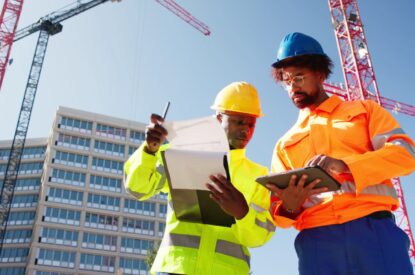With President Trump returning as the 2024 President-Elect, immigration crackdowns could be on the rise again, leaving the construction industry at a pivotal moment. The labor shortage in construction is already a pressing issue, and potential deportation policies may deepen this crisis. So, how can construction companies prepare for these possible changes and protect their workforce?
Let’s break it down and explore proactive steps your company can take to weather the storm.
Here’s what might be coming down the pipeline:
- Increased Workplace Audits: Immigration and Customs Enforcement (ICE) could ramp up inspections, targeting construction companies to ensure employees are legally authorized to work.
- E-Verify Compliance: Companies might face heightened pressure to use E-Verify, a system to confirm work authorization.
- Enforcement of I-9 Violations: Errors or omissions on I-9 employment eligibility forms could result in significant fines or legal action.
- Detention and Deportation: Undocumented workers identified during audits or workplace raids may face detention or removal.
Immigrant workers comprise an estimated 30 percent of the U.S. construction labor force, with a significant portion of them undocumented. These policies could drastically reduce the available workforce, delaying projects and driving up costs. Taking a proactive approach is crucial. Here are actionable steps your company can implement:
Tighten Up Employment Verification Practices
Start by ensuring all I-9 forms are complete and accurate. This document is critical for verifying an employee’s eligibility to work in the U.S. Regularly audit your employment records to catch and correct any errors before ICE does.
For extra assurance, consider enrolling in E-Verify, even if it’s not mandated in your state. This system helps confirm work authorization quickly and adds an extra layer of compliance.
Incorporate Compliance Into Contracts
Make immigration compliance part of your subcontractor agreements. Include clauses requiring subcontractors to verify the work eligibility of their employees. This not only protects your business but also ensures accountability throughout your workforce.
Educate and Train Your Team
Train your HR team and supervisors on the importance of employment compliance and how to recognize valid work authorization documents. This minimizes errors and protects your company from unintentional violations.
Build a Broader Talent Pipeline
Expand your recruitment strategies to reduce dependency on undocumented labor. Partner with local high schools and vocational programs to create apprenticeships and mentorships for young workers. Offering opportunities to recent graduates or those earning their GED can inspire the next generation to join the trades.
Referral incentives for authorized workers are another way to attract skilled labor while fostering a culture of compliance.
Collaborate with Legal and Industry Experts
Stay ahead of policy changes by working closely with legal counsel and industry consultants. They can help you navigate complex regulations and offer tailored advice for your specific business needs.
Advocate for Immigration Reform
Engage with trade associations and advocacy groups to support immigration policies that address labor shortages without jeopardizing your workforce. Programs like temporary work visas or paths to legalization could be game changers for the industry.
The construction industry is no stranger to challenges, but preparing now—through compliance, strategic recruitment, and innovation—can position your company to adapt and thrive, no matter what comes next.
Your people are your greatest asset. By protecting them and ensuring compliance, you’re not just safeguarding your business—you’re setting the stage for long-term success. Together, we can help your company continue building the future, confidently and competitively.






